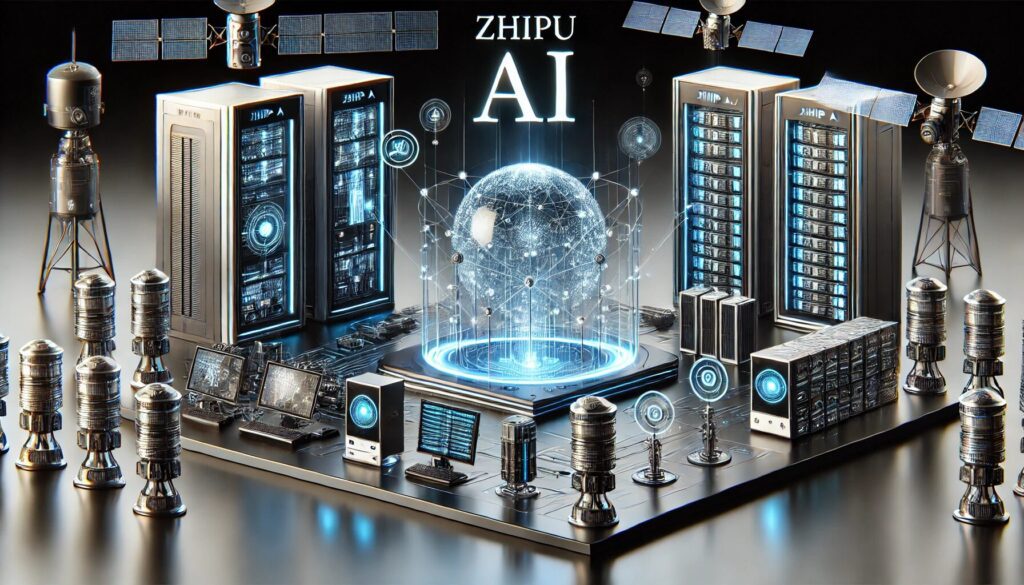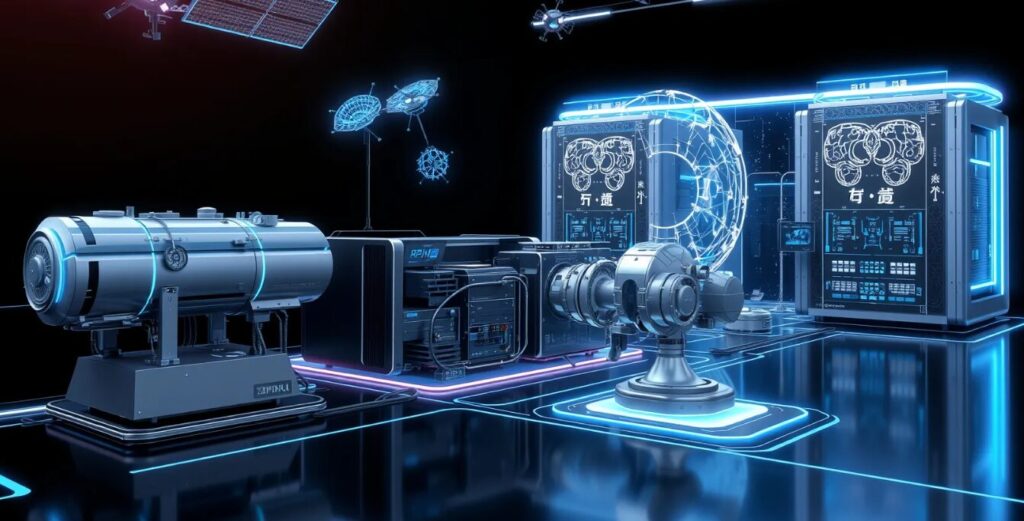
AI is Shaping the Future of Enterprise Workflows
The way we work is evolving, and AI is at the forefront of that transformation. Enterprise workflows, which once relied heavily on manual processes, are becoming smarter, faster, and more intuitive. The future isn’t about replacing human workers; it’s about empowering them. As AI agents grow more advanced, they’re tackling complex challenges in ways we could only dream of a few years ago. This shift is especially evident in how custom AI solutions are now fine-tuning workflows to specific business needs.
What is Zhipu AI and Why Should You Care?
If you haven’t heard of Zhipu AI, it’s time to tune in. Based in China, Zhipu AI is creating waves by offering custom AI solutions tailored to enterprise needs. The company is known for developing AI models that are not just scalable but adaptable to different industries. They understand that every business is unique, and a one-size-fits-all approach just doesn’t cut it anymore. What makes Zhipu stand out is their focus on creating solutions that solve real business problems while seamlessly integrating into existing systems.
The Power of Custom AI Solutions for Businesses
In today’s fast-paced world, the ability to adapt and optimize is crucial for businesses. This is where custom AI solutions come into play. Unlike generic AI systems, custom solutions are designed with a specific organization’s goals in mind. They can streamline processes that are unique to a business, cutting down time and cost. With Zhipu AI’s tailored models, businesses can automate not just the mundane but also the complex tasks that typically take up too much human brainpower.
Transforming Workflows: Efficiency Like Never Before
Imagine a world where routine tasks are handled automatically, and decision-making is supported by intelligent insights. That’s the power of AI transforming workflows. Zhipu AI has managed to enhance workflow efficiency by making tasks more seamless and less reliant on human intervention for repetitive jobs. From managing inventory to generating detailed reports, AI is bringing efficiency to every corner of an enterprise. The result? Teams can focus on more strategic, creative, and value-driven work instead of getting bogged down by mundane tasks.
Zhipu AI’s Impact on Decision-Making Processes
In the world of business, data is king, but raw data alone doesn’t make decisions—people do. However, the sheer volume of data today can be overwhelming. This is where AI agents come into play, offering real-time insights that would take humans days or even weeks to decipher. With Zhipu AI’s solutions, businesses can make smarter, more informed decisions in record time. By identifying trends, predicting outcomes, and offering actionable insights, these custom AI systems are truly enhancing decision-making processes.
Automating Repetitive Tasks: The New Era of Productivity
Repetitive tasks can be a huge drain on a company’s resources, but AI automation is changing the game. With Zhipu AI, enterprises can now automate tasks that used to eat up hours of employee time—things like data entry, scheduling, and even responding to customer inquiries. This level of automation doesn’t just free up time; it also improves accuracy by reducing the risk of human error. As a result, businesses can allocate resources more efficiently, focusing on growth and innovation rather than mundane, time-consuming tasks.
Enhancing Customer Experiences with AI-Powered Insights
Customers today expect personalized, seamless experiences, and AI is making that possible. Zhipu AI provides businesses with the tools to analyze vast amounts of customer data, offering insights that help tailor interactions in real time. Whether it’s recommending products, answering queries, or predicting customer needs, AI is reshaping how companies engage with their audiences. The beauty of this? AI can do it at scale. No matter how big your customer base, Zhipu AI’s solutions ensure each interaction feels personal and relevant, enhancing customer satisfaction and loyalty.
How Zhipu AI Fosters Collaboration in Teams
Collaboration is key to any business’s success, and AI can play a significant role in fostering that collaboration. Zhipu AI offers AI agents that assist teams in working more effectively together. These agents can help manage project timelines, distribute tasks based on team members’ strengths, and even generate insights from shared data. By automating routine administrative tasks and offering smart insights, AI enables teams to focus on the bigger picture—leading to more innovative solutions and efficient teamwork.
Real-World Examples: Zhipu AI in Action

Zhipu AI isn’t just theoretical; it’s making a tangible impact across industries. For instance, in manufacturing, Zhipu’s AI agents are helping to streamline supply chain management by predicting demand fluctuations and optimizing inventory. In the financial sector, they’re being used to detect anomalies in transactions, improving fraud detection. These real-world applications highlight just how versatile and powerful custom AI solutions can be. The adaptability of Zhipu’s AI models means they can be fine-tuned to meet the unique demands of any industry.
AI-Driven Data Analysis: Uncovering Hidden Insights
We live in an era where data is abundant, but without the right tools, it’s easy for businesses to drown in it. This is where AI-driven data analysis comes in. Zhipu AI’s models can sift through mountains of data in seconds, identifying patterns, correlations, and insights that would otherwise go unnoticed. By leveraging these hidden insights, companies can make better-informed decisions that give them a competitive edge. Whether it’s market trends or internal operations, AI-powered analytics can reveal opportunities for growth and improvement that were previously invisible.
Future-Proofing Business Strategies with AI Solutions
As the business landscape evolves, staying ahead of the curve is crucial. One of the key benefits of AI solutions is their ability to help companies future-proof their strategies. With Zhipu AI, enterprises can leverage predictive analytics to anticipate market trends, customer behavior, and even internal shifts. By using AI to identify opportunities and potential risks early, businesses can pivot quickly, keeping them one step ahead of competitors. The future isn’t just about reacting to changes—it’s about using AI to foresee them and act proactively.
Challenges Enterprises Face Adopting AI and How to Overcome Them
Implementing AI technology isn’t without its challenges. Many businesses face obstacles like high initial costs, concerns about data security, and the complexity of integrating AI with existing systems. However, Zhipu AI addresses these pain points by offering scalable, customizable solutions that fit seamlessly into different workflows. Additionally, their team works closely with businesses to ensure smooth transitions, from initial setup to ongoing support. Overcoming these hurdles is key to unlocking the full potential of AI—and with the right partner, it’s entirely possible.
The Role of AI in Personalizing Workflows
One-size-fits-all workflows are a thing of the past. Today, AI personalization is transforming how businesses operate by customizing workflows to suit individual roles, departments, and even entire industries. With Zhipu AI, companies can create AI-driven processes that adapt to the unique needs of their teams, whether it’s automating specific tasks, recommending actions based on previous behavior, or adjusting to changing conditions in real time. This level of personalization leads to more efficient and effective work environments, where every action is optimized for maximum productivity.
Zhipu AI: Bridging the Gap Between Technology and Human Expertise
Despite the advances in AI technology, human expertise remains a critical component in decision-making. Zhipu AI doesn’t aim to replace human input but to enhance it. By bridging the gap between data-driven insights and human intuition, Zhipu AI enables businesses to make smarter decisions, faster. AI handles the heavy lifting—analyzing data, providing insights—while humans focus on strategic, creative problem-solving. It’s this synergy between AI and human intelligence that is truly transforming the enterprise landscape.
GLM-4 vs GPT-4: How Zhipu AI is Competing on Home Turf

The Rise of Zhipu AI and GLM-4
Zhipu AI is relatively young compared to OpenAI, but it has made a name for itself, especially in China. The company’s flagship model, GLM-4 (General Language Model 4), was designed specifically to address challenges in Chinese natural language processing (NLP), but it’s not limited to that. It’s a versatile, multilingual model, with developers clearly intent on taking on global AI powerhouses.
The launch of GLM-4 has garnered significant attention. It’s not just the capability of understanding and generating Chinese text that’s impressive, but the model’s overall performance in handling complex tasks, including translation, question answering, and coding assistance.
GLM-4’s Strength in Chinese Language Processing
When it comes to Chinese language processing, Zhipu’s GLM-4 is the clear leader. This strength comes from the fact that Chinese characters and sentence structures are quite different from most alphabetic languages like English. This makes it a tough challenge for AI models that aren’t built with this complexity in mind.
1. Native Understanding of Chinese Nuances
GLM-4 has a profound grasp of Chinese idiomatic expressions, sentence structures, and regional dialects. The model is trained extensively on Chinese text, ensuring it can understand subtle differences in tone and meaning—nuances that might trip up even the best models like GPT-4.
2. Superior Accuracy in Chinese NLP Tasks
In tasks like summarization, translation, and text generation for Chinese, GLM-4 outperforms GPT-4 by a noticeable margin. GPT-4, although trained on a broad, multilingual dataset, sometimes misses the mark on contextual subtleties that are unique to Chinese, where things like word order and implied meaning can be tricky.
3. Tailored for Local Use Cases
Zhipu AI has designed GLM-4 with local applications in mind—whether it’s automated customer service in China or social media monitoring. This gives it a strong home-field advantage where language-specific tasks are concerned, and it’s helping Chinese businesses automate operations more efficiently.
GPT-4: The Global Powerhouse
It’s impossible to talk about AI models without acknowledging OpenAI’s GPT-4. This model is a global phenomenon, known for its versatility and high performance across a variety of tasks—from writing code to engaging in human-like conversations. GPT-4 sets the gold standard for general-purpose AI, and its multilingual capabilities are solid.
1. Breadth Over Depth
While GPT-4 is incredibly competent in many languages, including Chinese, its strength lies in its breadth. It’s trained across countless datasets in various languages, making it a well-rounded model. However, this generalization means it doesn’t always have the depth of understanding that models like GLM-4 do in specific languages like Chinese.
2. Dominating Global Benchmarks
In global AI benchmarks like MMLU (Massive Multitask Language Understanding) and SuperGLUE, GPT-4 still comes out on top. Its ability to adapt to varied tasks and provide consistently strong results is its hallmark. The model is a jack-of-all-trades, performing well across multiple domains—from legal analysis to creative writing.
3. Large Ecosystem and Adoption
GPT-4 also benefits from being part of a vast ecosystem of AI tools and integrations. Thanks to OpenAI’s wide partnerships and influence, it has been embedded in applications used globally, giving it a significant head start in adoption compared to GLM-4.
How Does GLM-4 Stack Up Against GPT-4 Globally?
Even though GLM-4 excels in Chinese language tasks, the real test is how it performs on the world stage against GPT-4.
1. Multilingual Performance
While GLM-4 is primarily built for Chinese NLP, it is also trained on multiple languages. However, when compared to GPT-4, GLM-4’s performance in languages outside of Chinese doesn’t quite reach the same level. GPT-4’s broader training sets and more extensive dataset make it a more well-rounded model when it comes to multilingual tasks.
2. Specialization vs. Generalization
GLM-4 is highly specialized, excelling in tasks that demand deep linguistic knowledge of Chinese. Meanwhile, GPT-4’s strength lies in its generalization. It can handle more varied tasks and switch between topics seamlessly. For global benchmarks that require multi-domain knowledge, GPT-4 remains a tough competitor.
3. Innovation in Local Markets
Zhipu AI is innovating at breakneck speed. With its focus on local industries and regional applications, GLM-4 could easily become the go-to model for Chinese businesses and consumers who need reliable AI models tailored to their language and culture. Over time, this specialized focus could enable it to carve out a niche market where it can outperform GPT-4.
Where Does Zhipu AI Go From Here?
Zhipu AI has a strategic advantage in its own region. While GPT-4 dominates globally, GLM-4 could corner the Chinese market, and perhaps, even extend to other East Asian languages like Korean or Japanese. If Zhipu AI can build on GLM-4’s existing strengths and expand its capabilities, it might not be long before we see it competing with GPT-4 outside its home turf.
Final Thoughts
When it comes to Chinese language processing, GLM-4 undoubtedly has the upper hand. However, GPT-4 still leads globally, especially when it comes to handling diverse tasks and languages. That said, it’s exciting to see a regional player like Zhipu AI competing so effectively against a global giant like OpenAI.
As the competition heats up, one thing’s for sure—users benefit from better AI models. And who knows, in a few years, GLM-4 might be giving GPT-4 a serious run for its money on a global scale.
Why AI Ethics Matter in Enterprise Solutions
As AI becomes more integrated into business workflows, the importance of AI ethics cannot be overstated. Ensuring that AI systems are transparent, fair, and unbiased is essential, particularly in industries like finance, healthcare, and law. Zhipu AI places a strong emphasis on ethical AI, ensuring their models are designed to be accountable and trustworthy. By addressing concerns around data privacy, bias, and algorithm transparency, Zhipu AI is leading the charge in building AI solutions that not only enhance business performance but also uphold ethical standards.
What’s Next? The Future of AI and Workflow Integration
The future of AI and its integration into enterprise workflows is both exciting and transformative. As Zhipu AI continues to innovate, we can expect even more sophisticated AI solutions that go beyond automation and data analysis. Future advancements may include AI systems that can adapt and evolve in real-time, learning from the environment and making autonomous decisions without human input. AI integration will likely become more seamless, with AI agents working alongside human employees in every aspect of business—from customer service to product development.
Additionally, AI-powered collaboration tools will become more intuitive, enabling global teams to work together more fluidly. These tools may offer predictive suggestions, adapt to individual working styles, and even help mitigate conflicts by offering data-backed solutions. The continued advancements in AI could redefine how we view productivity, allowing businesses to scale at unprecedented rates while maintaining quality and innovation.
As Zhipu AI and other innovators push the boundaries, the relationship between humans and AI will likely become more collaborative, ultimately creating a future where AI empowers us to work smarter, not harder.
Resources
- Zhipu AI Official Website
Explore Zhipu AI’s cutting-edge solutions, case studies, and the latest advancements in AI-driven enterprise tools.
Website: Zhipu AI - AI Transforming Enterprises – Harvard Business Review
A comprehensive look at how AI is reshaping enterprise workflows, with a focus on automation and decision-making.
Article: How AI is Changing Workflows - The Ethics of Artificial Intelligence – MIT Technology Review
Learn about the ethical considerations surrounding AI in the workplace, particularly in industries handling sensitive data.
Article: AI Ethics in Business - AI in Enterprise: Trends and Strategies – Gartner
Detailed reports on how businesses are adopting AI technologies, with insights into future trends and best practices.
Website: Gartner AI Solutions - McKinsey’s Guide to AI in Business
This guide explores real-world applications of AI in enterprise environments and the value it brings to businesses.
Guide: AI in Business - Forbes: The Future of Work with AI
An insightful article covering how AI is transforming business workflows and enabling enterprises to scale rapidly.
Article: The Future of AI in Work